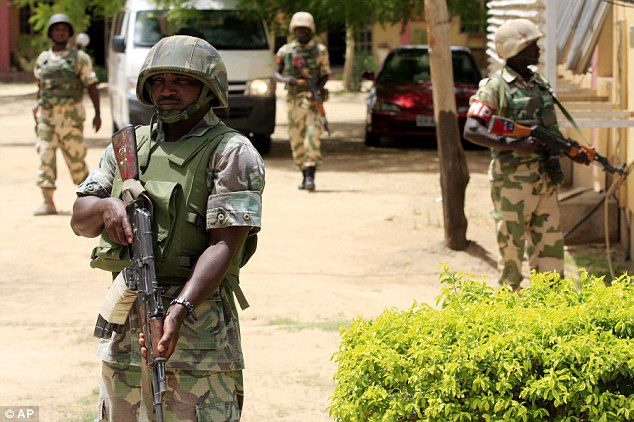Global Issues
Proximate and underlying causes of Nigeria’s conflicts

To solve a problem one must endeavour to find its cause(s) and nip it in the bud, before it becomes convoluted. However, sometimes, the cause may be known, but the will and honesty to bare it truthfully before those involved may be lacking. Certain interest(s) might creep in to try to cover the truth or twist it for personal or a particular group’s interests. For this reason, most times, problems persist and people suffer for it. Therefore, for a nation to make progress it is necessary that they learn from their history; deciphering the proximate and underlying causes of their problems – no matter how intricate they might be – they should not hide from their own history. Nations should learn to be instructed from their own history, even when it might not be gleeful, and be courageous to expunge those things that keep them from making progress.
Nigeria’s situation is so sad, sodden with conflicts that could have been nipped in the bud. There is no conflict that has ever appeared overnight. There is definitely a build-up towards violent conflicts, and therein, the underlying and proximate causes of conflict among neighbors and brothers. The proximate causes of conflicts within a state could be internal – bad leaders at elites’ level, serious domestic problems and/or radicalization – or external – bad neighbors and/or brothers. And no conflict can be resolved without addressing the underlying causes. This is where Nigeria has always gotten it wrong, and has perpetually used the cosmetic approach to its problems, which never addresses the underlying causes of the problems, thereby keeping the country in a stalemate.
Analyzing Nigeria’s conflicts, one would begin to discern some of its proximate and underlying causes that could be part of the solution. Obviously, one of the proximate causes of Nigeria’s conflicts is what is called the elites problem. The state has a responsibility to suppress violence among its citizens, however, when neighbors or citizens kill one another that must mean that at the very least the state has failed, become complicit or has become the sponsor of the violence. This scenario plays out when there is a strategic dilemma of information failure and the problem of credible commitment to nation building – which emanate from a lack of elites cooperation and lack of communication between the elites – and by extension between ethnic groups that consist a nation. Ironically, Nigerian elites are very cooperative only in one purpose – that is, corruption and the impoverishment of the masses – but lack the cooperative vision and the leadership skills to engineer a nation wherein Nigerians could thrive.
Next to this proximate cause, are the underlying causes of Nigeria’s conflicts; one of such being the perception of mutual agreements and lack of trust amongst the elites and between the ethnic groups within the Nigerian state.Of course, in a plural state like Nigeria, one should not expect the least in complex perceptions and opinions. The ‘nation’ is broadly divided into south and north, and in the same vein there are differences in perceptions of mutual agreements and lack of trust in the other’s commitment to the existence of the supposedly nation and how to move it forward.
On the one hand, the north with its born-to-rule mentality appears to be in the one Nigerian agreement only for what it could get out of it for the north and/or its elites. This can be found in the proclamations of its foremost founding fathers, sir Ahmadu Bello, who believes that the north should be for the north, and that the amalgamation of the south and north was a mistake. I agree with him on the latter. However, should not suppose that the nation, therefore, should always be dragged backwards based on northern interests. Northern interests in one Nigeria seem to be not for what it could contribute to the Nigerian project, but for what it could selfishly get out of it.
On the other hand, the south with more progressive minds, however, sees the north not only as neighbors, but as well as their brothers. This is why the south has always sacrificed more to carry the north along, and they have paid dearly for it, in that, the north has continued to drag the south backwards like a crab. The south believes more in fairness and equality of all nations that formed the Nigerian state. Moving forward, the south must learn to utterly squash the idea that they must carry the north along in the spirit of one Nigeria, because they have shown no sign of wanting to be carried along. More so, the south should rather advocate for a political situation that would allow each region and ethnic groups to develop at its own pace and compete healthily with one another, while still keeping the peace of Nigeria. So, this perception of mutual agreements and lack of trust has led to mutual blame game and implementation troubles that stagnates the nation.
Another underlying cause of Nigeria’s conflicts is change in ethno-political situation. Each time there is a shift in different ethnic groups’ access to the resources of the common state, which could be material or political, it has always resulted into one form of conflict or another. They often turn violent when they take religious and ethnic shapes based on the country’s fault line.
The north has always played the preponderance card to perpetuate their political will and control over the south, and in turn, have dictated how the resources of the nation are distributed among its state axis, but to the advantage of the north. This mentality is not because they are numerically important than the south at least there is no actual scientific evidence that has proved that the north is in any way more populated than the south, but what appears to be deceptive manoeuvring for a northern hegemony. If the north is actually numerically important than the south, why is it always opposed to census that would account religion and ethnicity in Nigeria?
No doubt, the north keeps pulling backward knowing that modernity and technologically advancements could catch up with them in this scheming. So far, this has given the north the upper hand to chronically depend on the abundant material resources of the south by using their cling on the political resource to be in control. Also, it has resulted into bickering and backbiting among the ethnic groups. And whenever there is a shift of this ethno-political situation or the status quo, which the north has always enjoyed, mayhems are often unleashed on Nigerians; a ploy to create unbalance that could return political resource that gives easy access to material resource back to where it was.
More so, Nigeria’s political environment is another of its underlying cause of conflicts. Its political environment is casual to its conflict. Nigeria’s political environment has for long been a chronic factor for authoritarian political culture that diminishes any sense of responsibility in the country. The country’s political environment rewards irresponsibility and radical behaviors. In it is a situation where institutions that were meant to bring sanity and promote accountability are often stifled, while those that still stand are only authoritarian apparatus for witch-hunting the opposition and seeming enemies of the regime.
To resist based on different ideological dispositions, one must act irresponsibly, for whatever desired change whether good or bad to happen. For this reason, it is common to see different militia groups organized under different ethnic groups within the country to resist the state. For example, OPC holding sway in the west, MASSOB in the east, MASSOP and MEND within minority Niger Delta areas of the country, and today, the devilish leopard called Boko Haram. These conflicts groups fight for secession, resource control or to topple the government. Whereby they succeed in matching the power of the state, they are often rewarded in some ways. In Nigeria, the reward takes the form of amnesty or government contracts. These irresponsible acts have often encouraged picking up of arms against the state as a result of the rivalries.
There is also what is called the sociological evil as another underlying cause of Nigeria’s conflicts. Well, this is found in humans ability to discount “the suffering of those they know well and of directly inflicting the cruelest forms of suffering upon them” (Esses & Vernon). The examples of Rwanda, Bosnia, Poland and Igbo pogroms in Nigeria has thought us a vital lesson, that being neighbors and knowing each other is not enough to prevent cruelty. Although, neighborliness can of course inhibit brutality, but we should not suppose that it must always happen. Therefore, it is important to know when it does and when it does not.
In a dire situation, it is not impossible for people to tend to blame others for their woes. This has become so true of Nigeria’s situation. Again, northern Nigeria has been backward in almost every indices of development compared to their southern counterpart. Because northern elites have tenaciously malnourished its people intellectually and even physically, therefore, the transferred bitterness and hates towards the south, particularly the Igbos who in the spirit of one Nigeria see Nigeria as their home and freely reside anywhere they want in Nigeria. As a people naturally gifted, the Igbos survive wherever you place them, no matter the odds against them. No doubt, despite being denied of their wealth and many opportunities after the Civil War, they still emerged top as one of the progressive ethnic groups in Nigeria, on a par with the southwestern (Yorubas) Nigeria, which did not suffer much from that war, but far ahead of northern Nigeria, which benefitted immensely from that war.
Sometimes, the north sees the Igbos as the cause of their backwardness and economic misfortunes, the reason for the scape-goating, blaming and attempts to devaluate the hard earned efforts of the Igbos. These socio-psychological factors have often exposed the Igbos to the prejudices, categorization and hates of the north. They are perceived as a threat and something that must be dealt with by elimination, therefore, the incessant killing of Igbos and destruction of their properties in Nigeria’s north.
It often sounds like a cliché when you say that the north is backward in development compared to the south, however that is just the truth. Due to discriminatory political institutions, Nigeria has also found itself in conflicts. For example, in education, the north has the lowest cut-off marks expected to enter secondary school or higher institution, while Nigeria’s southeast and southwest cut-offs marks rank the highest in the country. But you would expect that these people in the south that work and study harder than their northern neighbors should occupy key positions in the affairs of the state, especially in governance. Instead, what is obtained in Nigeria is where northerners with the least education occupy key positions in the state. No wonder, the country is not making any significant progress; because appointments are not made based on skills and merits, but based on where you come from and who you know. This has resulted into penchant for mediocrity, which encourages bad leadership.
Further, exclusionary ideology has also placed Nigeria into conflict situations. Nigeria’s exclusionary ideology does not encourage equal citizenship of all Nigerians. Nigerians do not see themselves first as a Nigerian, but first on their ethnic origins – the reason for the indigene and non-indigene conflicts – where Nigerians are deported within their own country. Sadly, this is a reality in Nigeria! This form of ideology that does not recognize Nigerians anywhere they are within the country as citizens of Nigeria, is worrisome, and has been a cause of contentiousness among the ethnic groups.
Besides the aforementioned, ethnic geography is another underlying cause of conflicts within Nigeria. After the Civil War, as a move to destabilize the Igbos, the then northern military regimes created states with deceptive border areas between the Igbos and their minority neighbors, whereby Igbo territories became part of non-Igbo territories. Was it not for the maturity of the Igbos with their neighbors, this could also plunge Nigeria into crises between them and their minority neighbors in the grab for territories and boundaries. Somehow, this has become a blessing in disguise for Ndi-Igbo, giving them a foreign homeland among their neighbors, and in turn, now cementing their alliances with these neighboring minorities.
In addition, the vulnerability of minority has also been an underlying cause of Nigeria’s conflicts. Nigeria is a state where equity and justice is non-existent. Those that primarily control the political and material resources are few elites from the major ethnic groups – which are, Hausa, Igbo and Yoruba – with little or no opportunities given to the minority ethnic groups even though the wealth of the nation largely come from under their land. However, this scenario is changing, it has been an incentive and underlying cause of conflicts, especially when the north solely controls political and material resources of the state. The minority ethnic groups feels deprived of their wealth and raped with the constant degradation of their environment by pollution, yet nothing to show for it, therefore, they have to resist such to make their voice to be heard even if it requires taking up arms against the state. They are often discriminated and treated as the inferior groups within Nigeria, leading to them questioning the political system.
True, conflicts cannot be entirely curbed, but it is possible to resolve some by addressing its underlying causes. So, if the incentive for conflict is not large it cannot lead to large costs and consequences. Encouraging independent civil societies that would deny perpetrators the monopoly of informational influence would help to reduce conflicts within a state. Also, creating cultural modalities that are inclusive help to reduce conflicts. Instead of victimizing, people should have a sense of belonging wherever they are within the country. The elites and leaders should play a central and visionary role and not selfish short-term gains. They should be nationalists who would not sell-out their nation for bread and butter or political expedient.
You can find Rees Chikwendu on Twitter @reesful



















